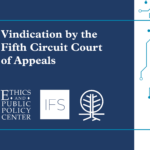
Published September 29, 2022
Two weeks ago, the U.S. Court of Appeals for the Fifth Circuit rightly upheld Texas’ social media law, overturning the District Court’s injunction from last December and marking a significant victory against Big Tech censorship.
The Texas anti-discrimination social media law (HB 20), which passed last September, seeks to limit Big Tech companies’ power to silence viewpoints they don’t like. The law prohibits social media platforms with more than 50 million active monthly U.S. users from censoring users or their expressions based on the viewpoint expressed. Along with explicitly prohibiting viewpoint discrimination by social media companies, the law enables censored users to seek declaratory and injunctive relief in court.
The Fifth Circuit forcefully rejected the Big Tech platforms’ attempt to use the First Amendment to justify their censorship—in the court’s words, “to extract a freewheeling censorship right from the Constitution’s free speech guarantee.” The tech companies’ censorship is not speech.
In the opinion, Judge Andy Oldham (a Trump appointee) puts his finger precisely on the main problem with the tech companies’ challenge to the Texas law—these companies have inverted the First Amendment. Judge Oldham explains that the First Amendment protects every person’s right to “the freedom of speech,” but the platforms argued that buried somewhere in it is a corporation’s right to censor speech.
Rather than accepting such an unenumerated right as cause to strike down Texas’ law, the court found that the law is in fact constitutional because it neither compels nor obstructs the platforms’ own free speech in any way. Social media platforms are free to tweet or post as much as they’d like—the non-discrimination requirements of the law simply prohibit viewpoint discrimination where the companies serve as conduits for the speech of others. The speech at stake is not the speech of the companies, but the speech of the users.
The Fifth Circuit further states the Supreme Court has never recognized “editorial discretion” as an independent category of First Amendment-protected expression. And even if it had, the Fifth Circuit disagrees with the Eleventh Circuit’s opinion (released in May regarding Florida’s social media law, which is very different from the Texas law) that social media platforms’ censorship is akin to the “editorial judgment” that’s been mentioned in Supreme Court doctrine.
The bottom line is that social media censorship is not “editorial discretion.” And it is not protected by the First Amendment. Unlike a newspaper editor or parade organizer, social media companies do not review all content they host. A social media platform is a passive conduit. It rarely edits, and its infinite bandwidth gives it no need to edit. Put simply, platforms cannot possibly express themselves in the sheer billions of posts they cannot review. Nor can the platforms’ inconsistent and opaque content moderation practices constitute a coherent “message” worthy of First Amendment protection.
It should also be noted that platforms can’t claim to be exercising “editorial discretion” with their censorship decisions and at the same time claim they have immunity for all their content moderation under Section 230. They can’t have their cake and eat it too—acting like publishers but claiming exemption from any publisher liability.
The Fifth Circuit also acknowledges that Big Tech platforms can be treated as common carriers. The common carrier doctrine, the court notes, “vests the Texas Legislature with the power to prevent the Platforms from discriminating against Texas users.” The court finds that the Texas law’s basic nondiscrimination requirement “falls comfortably within the historical ambit of permissible common carrier regulation.”
For centuries, courts have required common carriers—the dominant communications and transportation channels available to the public—to serve all comers without discrimination. Common carriers’ numerous legal requirements have never raised First Amendment concerns. Texas’ law merely applies this historical body of common carrier law to today’s major communications channels: social media platforms.
In upholding Texas’ regulation of social media platforms as common carriers, the Fifth Circuit explicitly split with the Eleventh Circuit. The latter had concluded that common carrier doctrine does not support the constitutionality of nondiscrimination obligations on social media platforms.
Given this circuit split on the common carrier question, as well as on the issue of whether social media platforms’ “editorial discretion” is protected speech under the First Amendment, the Texas law is likely headed to the Supreme Court. And that case will be for all the marbles. If states are to have any chance at reining in Big Tech’s viewpoint censorship, Texas’ law must be upheld.
Justices Samuel Alito, Clarence Thomas, and Neil Gorsuch have already indicated support for the law in their dissent from the Court’s granting of an emergency application to stay the law earlier this year. Justices Amy Coney Barrett and Brett Kavanaugh, its fate lies with you.
Clare Morell is a Policy Analyst at the Ethics and Public Policy Center, where she works on EPPC’s Technology and Human Flourishing Project. Prior to joining EPPC, Ms. Morell worked in both the White House Counsel’s Office and the Department of Justice, as well as in the private and non-profit sectors.
Photo by Christina @ wocintechchat.com on Unsplash
Clare Morell is a Senior Policy Analyst at the Ethics and Public Policy Center, where she directs EPPC’s Technology and Human Flourishing Project. Prior to joining EPPC, Ms. Morell worked in both the White House Counsel’s Office and the Department of Justice, as well as in the private and non-profit sectors.









